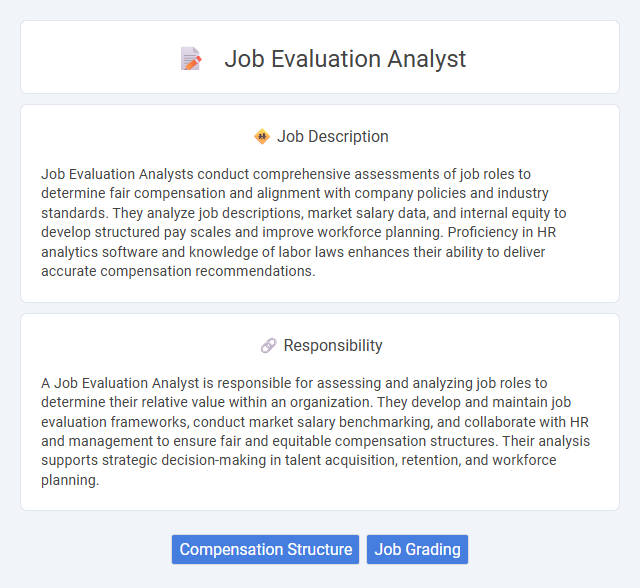
Job Evaluation Analysts conduct comprehensive assessments of job roles to determine fair compensation and alignment with company policies and industry standards. They analyze job descriptions, market salary data, and internal equity to develop structured pay scales and improve workforce planning. Proficiency in HR analytics software and knowledge of labor laws enhances their ability to deliver accurate compensation recommendations.
Individuals with strong analytical skills and a keen attention to detail are likely well-suited for a Job Evaluation Analyst role. People who enjoy assessing job roles, interpreting data, and making objective recommendations may find this position aligns with their strengths. Those preferring dynamic, interpersonal tasks may be less compatible with the routine and data-focused nature of the job.
Qualification
A Job Evaluation Analyst typically requires a bachelor's degree in human resources, business administration, or a related field, with strong analytical and data interpretation skills. Proficiency in job evaluation methodologies, market salary analysis, and HR information systems is essential for accurately assessing job roles and compensation structures. Experience with compensation benchmarking, job description analysis, and compliance with labor regulations enhances the effectiveness of job evaluation processes.
Responsibility
A Job Evaluation Analyst is responsible for assessing and analyzing job roles to determine their relative value within an organization. They develop and maintain job evaluation frameworks, conduct market salary benchmarking, and collaborate with HR and management to ensure fair and equitable compensation structures. Their analysis supports strategic decision-making in talent acquisition, retention, and workforce planning.
Benefit
A Job Evaluation Analyst likely enhances organizational efficiency by systematically assessing job roles to ensure equitable compensation structures. Their work probably contributes to employee satisfaction and retention by promoting transparency and fairness in pay scales. Organizations might benefit from reduced turnover and improved talent management through the insights provided by these evaluations.
Challenge
Job Evaluation Analysts likely encounter challenges in accurately assessing the relative value of diverse roles within an organization, which requires balancing quantitative data with qualitative insights. Navigating complex compensation structures and aligning evaluations with evolving industry standards may pose ongoing difficulties. The role probably demands continuous adaptation to regulatory changes and organizational growth, increasing the complexity of maintaining fair and competitive job assessments.
Career Advancement
A Job Evaluation Analyst plays a critical role in assessing job roles, responsibilities, and compensation structures to ensure internal equity and market competitiveness. Mastery in data analysis, compensation trends, and organizational behavior equips professionals for senior HR roles such as Compensation Manager or HR Business Partner. Continuous skill development in analytics and strategic workforce planning significantly enhances career advancement opportunities within human resources management.
Key Terms
Compensation Structure
Job Evaluation Analysts specialize in assessing and designing compensation structures to ensure internal equity and market competitiveness. They analyze job roles, conduct salary benchmarking, and develop grading systems aligned with organizational goals and industry standards. Expertise in data-driven compensation strategies improves workforce satisfaction and supports talent retention efforts.
Job Grading
A Job Evaluation Analyst specializes in job grading by systematically assessing and categorizing positions based on factors like responsibilities, skills, and experience required. Utilizing quantitative and qualitative data, they develop equitable grading frameworks that ensure internal pay equity and alignment with market standards. Their expertise supports organizations in maintaining competitive compensation structures and facilitating transparent career progression.
 kuljobs.com
kuljobs.com